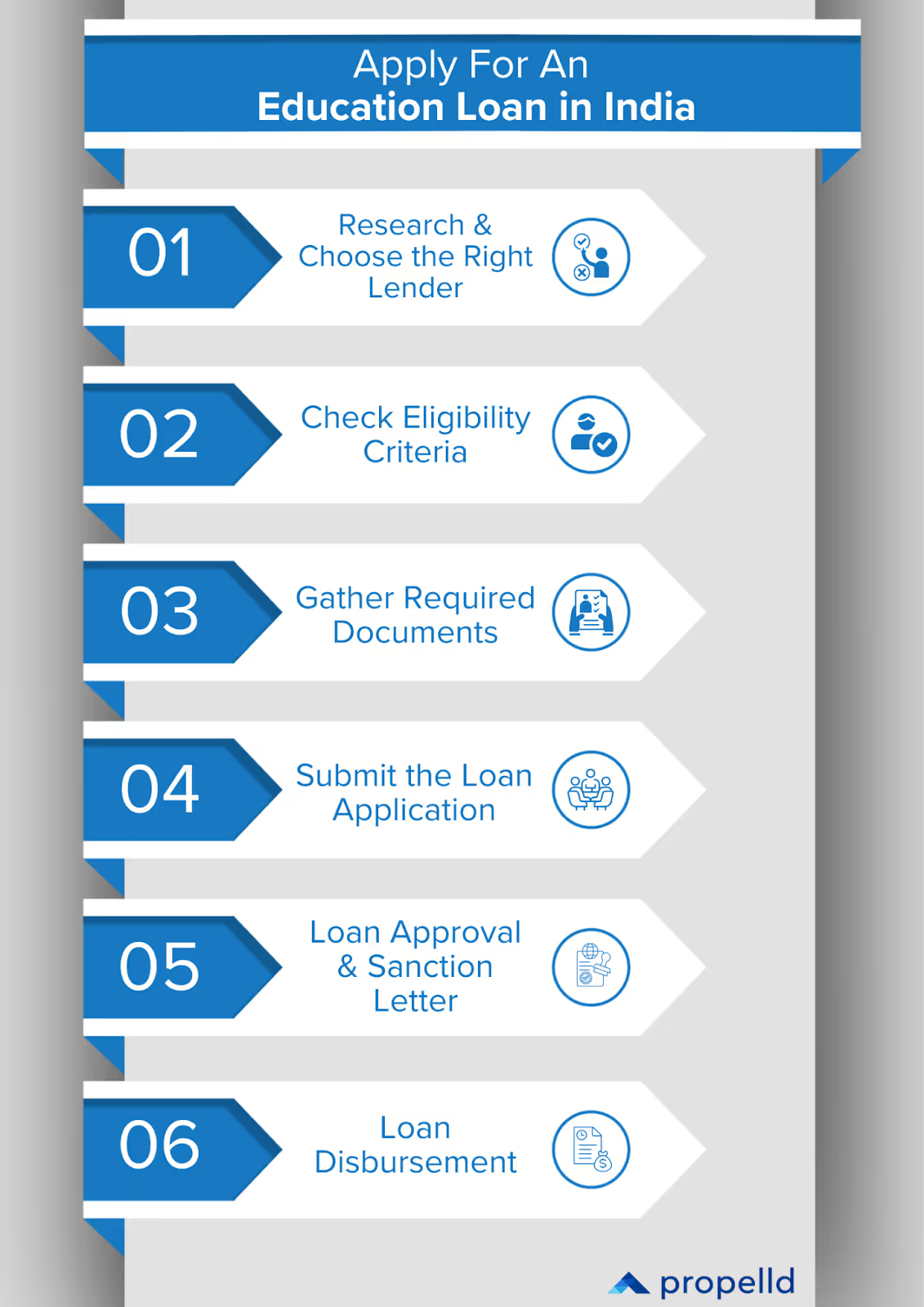Financing higher education can be challenging, and many students wonder: Can we take education loans from two banks in India? With the rising cost of tuition, education loans have become necessary for many. Education loan disbursements in India saw a 6.25% increase, rising from INR 16,000 crore in 2021-22 to INR 17,000 crore in 2022-23.
Taking loans from two banks is a good idea to cover expenses, but it comes with risks, regulations, and financial responsibilities. Before you apply, it's crucial to understand the legal aspects and lender policies and how they can impact your finances.
Factors to Consider Before Applying for a Second Education Loan
Before you apply for a second education loan, lenders evaluate several important aspects to decide whether to approve your new loan. It’s not automatic that you will get another loan just because you had one before. Here are the key factors they look at:
- Eligibility Status: You qualified for your first loan, but now lenders check both your and your co-applicants’ CIBIL scores again. These scores change depending on how you have been repaying your first loan, whether you have started repayments or not.
- Type of First Loan: The kind of loan you took initially—for example, whether it was for graduation or another course—matters when considering a second loan.
- Loan Provider: The bank or financial institution from which you took your first loan is also taken into account.
- Repayment History: Making timely payments on your first loan and maintaining a good credit score increases your chances of getting a second loan approved.
- Reason for the Second Loan: Lenders want a valid and convincing reason for why you need another education loan.
These points help lenders assess how risky it is to provide you with a second education loan based on your past performance and current needs.
Secured Education Loans from Two Banks
Securing an education loan is crucial for students planning to study in India or abroad. A secured education loan, backed by collateral such as property, fixed deposits, or government bonds, offers lower interest rates and higher loan amounts.
Students planning to apply for secured loans from multiple banks should understand the differences between collateral and non-collateral education loans and how security assets are evaluated across lenders.
Types of Collateral Accepted by Lenders for Secured Education Loans
Most public sector banks in India mandate collateral for education loans above INR 7.5 lakh, while private banks and NBFCs may have varying thresholds.
Below is a breakdown of the collateral types accepted for education loans.
Get Education Loan 10X Faster than Banks.
Unsecured Education Loans from Two Banks
Many students wonder whether they can apply for funding from two different banks for unsecured education loans. Unlike secured loans, unsecured education loans do not require collateral and are sanctioned based on academic merit, the income of the co-applicant, and creditworthiness.
Here’s what you need to know before applying for an unsecured education loan from two banks.
1. RBI Guidelines and Loan Restrictions
As per RBI guidelines, borrowers cannot take multiple education loans for the same course from different banks unless there is a clear justification. Most lenders conduct a CIBIL check, and multiple unsecured loan applications may lead to rejection due to increased financial risk.
2. Impact on Loan Approval and Interest Rates
Banks and NBFCs assess a student's existing debt obligations before approving a new loan. Taking multiple unsecured loans increases the debt burden, which may result in higher interest rates or difficulty in repayment.
Looking for an education loan without pledging collateral? Check out our detailed blog on Banks That Give Education Loans Without Collateral for Abroad and unlock your study dreams hassle-free!
Can We Take Education Loan from Two Banks in India?
With the rising demand for education loans in India, banks and financial institutions offer a variety of loan schemes. This often creates confusion for first-time borrowers, who sometimes apply for two different loan schemes from separate lenders to manage their education expenses efficiently.
For instance, a student who does not have sufficient collateral may choose to apply for:
- A secured education loan from Lender 1 to cover tuition fees (offering a lower interest rate).
- An unsecured education loan from Lender 2 to manage living expenses and other study-related costs.
Similarly, some students prioritise quick loan approvals and might first approach:
- A private bank or NBFC (Lender 1) for faster loan sanction.
- Later, they may apply for a secured loan from a public sector bank (Lender 2) to take advantage of lower interest rates.
However, many first-time applicants do not realise that applying for education loans from two different lenders is not allowed. But why is that the case?
Yes, students can take more than one education loan under specific guidelines. Learn more about the education loan policy for taking loans from two banks in India, including eligibility and repayment structure.
The Role of CIBIL Score in Education Loan Approval
1. CIBIL Score and Loan Sanctioning
- The CIBIL score is assigned by the Credit Bureau of India Limited, which tracks an individual’s financial history, credit card payments, loan repayments, and EMI schedules.
2. CIBIL Score Requirements for Education Loans
- Public sector banks like SBI, Bank of Baroda, and Punjab National Bank typically require a CIBIL score of 650 or above for secured education loan approvals.
- Private banks and NBFCs often have stricter criteria, usually demanding a CIBIL score above 700 for unsecured loan sanctioning.
- While a lower CIBIL score does not automatically disqualify an applicant, it significantly reduces the chances of approval, and loan sanctioning is left to the lender’s discretion.
Struggling with a low CIBIL score? Don’t let it stand in the way of your education loan! Check out our detailed blog on How to Get an Education Loan with Low CIBIL Score: Tips, Banks, and Alternatives to explore smart solutions and lenders that can help.
Get 40 Lacs No Collateral Education Loan
Can We Take Education Loan From Two Banks For Same Course?
Many students exploring education loan options in India consider applying to two different lenders simultaneously—one for a secured loan and another for an unsecured loan—to maximise their funding opportunities.
How Lenders Use CIBIL Scores in Loan Approval?
Every lender, whether a public-sector bank, private bank, or NBFC, first checks the CIBIL score of the applicant and the co-applicant (if any) before processing the loan application.
Below is a step-by-step breakdown of what happens when a student applies for two different education loans for the same course.
Want to boost your creditworthiness? 🚀 Check out our detailed blog on How to Increase CIBIL Score – 10 Easy Tips and take control of your financial future!
Can We Take Education Loan From Two Banks For Abroad Studies?
It is generally possible to apply for education loans from two different banks for the same course abroad, but only one bank will disburse the loan amount. While students may seek multiple loan offers to compare terms, a student cannot receive disbursements from two banks simultaneously for the same education expense. The loan approval and disbursement process usually results in the final loan being sanctioned and disbursed by only one lender. Here are few points you can consider:
- You can apply to multiple banks, but only one loan will be disbursed.
- Banks assess creditworthiness and existing debts before sanctioning loans.
- Managing multiple loans can be complex and affect repayment.
- Some banks do offer second education loans or top-up loans, but these come with specific conditions and higher rates.
- It is best to choose the best lender to avoid complications.
How To Apply For An Education Loan in India?

If you're planning to finance your higher studies, here's a complete guide on education loan eligibility and application process in India to help you get started.
Applying for an education loan in India involves key steps that vary depending on the lender (public banks, private banks, NBFCs). Here’s a detailed guide on how to apply:
1. Research & Choose the Right Lender
Compare interest rates, repayment terms, processing fees, and moratorium periods across public banks, private banks, and NBFCs.
2. Check Eligibility Criteria
The applicant must be an Indian citizen and be admitted to a recognised Indian or foreign university. A co-applicant (parent/guardian) with a stable income is required in most cases.
For secured loans, acceptable collateral includes property, fixed deposits, or insurance policies.
3. Gather Required Documents
Lenders require:
- KYC Documents (Aadhaar, PAN, passport)
- Admission proof (Offer letter, fee structure)
- Academic records (10th, 12th, degree certificates)
- Income proof (ITR, salary slips of co-applicant)
- Collateral documents (secured loan)
4. Submit the Loan Application
Apply online via the lender’s website or visit a branch. Complete the loan application form, provide the necessary documents, and pay the processing fee, which varies by lender.
5. Loan Approval & Sanction Letter
The lender reviews the application, checks the CIBIL score, and verifies documents.
6. Loan Disbursement
Once the loan agreement is signed, the funds are released directly to the educational institution according to the specified fee structure.
Want to know the step-by-step process to secure an education loan hassle-free? Check out our complete guide on How to Apply for an Education Loan in India and make your application process smooth and stress-free!
While students can apply for education loans from two different lenders, only one lender will disburse the loan. The moment one lender disburses the funds, the applicant’s CIBIL score reduces, leading to the rejection of the second loan. Therefore, students should carefully plan their loan applications and prioritise lenders based on their funding needs, interest rates, and disbursement timelines.
Why limit your dreams when Propelld offers hassle-free education loans tailored to your needs? With flexible repayment plans, quick digital approvals, and loan amounts up to INR 50 lakh without collateral—you can secure the right funding without the complications of multiple lenders.











.svg)